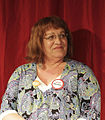Portal:Transgender
Welcome to the Transgender portal Being transgender is distinct from sexual orientation, and transgender people may identify as heterosexual (straight), homosexual (gay or lesbian), bisexual, asexual, or otherwise, or may decline to label their sexual orientation. The opposite of transgender is cisgender, which describes persons whose gender identity matches their assigned sex. Accurate statistics on the number of transgender people vary widely, in part due to different definitions of what constitutes being transgender. Some countries, such as Canada, collect census data on transgender people. Generally, fewer than 1% of the worldwide population are transgender, with figures ranging from <0.1% to 0.6%. Many transgender people experience gender dysphoria, and some seek medical treatments such as hormone replacement therapy, gender-affirming surgery, or psychotherapy. Not all transgender people desire these treatments, and some cannot undergo them for financial or medical reasons. The legal status of transgender people varies by jurisdiction. Many transgender people experience transphobia, or violence or discrimination towards transgender people, in the workplace, in accessing public accommodations, and in healthcare. In many places, they are not legally protected from discrimination. Several cultural events are held to celebrate the awareness of transgender people, including Transgender Day of Remembrance and International Transgender Day of Visibility, and the transgender flag is a common transgender pride symbol. (Full article...) Selected article This article addresses the history of transgender people in the United States from prior to Western contact until the present. There are a few historical accounts of transgender people that have been present in the land now known as the United States at least since the early 1600s. Before Western contact, some Native American tribes had third gender people whose social roles varied from tribe to tribe. People dressing and living differently from the gender roles typical of their sex assigned at birth and contributing to various aspects of American history and culture have been documented from the 17th century to the present day. In the 20th and 21st centuries, advances in gender-affirming surgery as well as transgender activism have influenced transgender life and the popular perception of transgender people in the United States. Selected biographyJordana LeSesne, formerly known as 1.8.7, is an American musician and producer from Pittsburgh, Pennsylvania. She now produces and performs as Jordana. She became known in the mid-1990s as a drum and bass producer. Vibe magazine called her "one of the most respected Drum ‘n' Bass producers in the US." In 2015, she was named as one of "20 women who shaped the history of dance music" by Mixmag. She is transgender and came out in 1998. She has released over 50 tracks, including four albums, several EPs, and remixes under the alias 1.8.7. The 1997 album When Worlds Collide became known for its "dark pummeling assaults". She has licensed tracks for compilations as well as the Sci Fi Channel. Three of her albums charted in the Top 25 of both the CMJ (College Music Journal) and Mixmag U.S. (later Mixer Magazine, now defunct) for 1997 as well as 1998 and 1999. Her third album "The Cities Collection" debuted in the CMJ Top 5 climbed to the #2 position on CMJ Music Monthly's dance chart for June 2000. Did you know (auto-generated) -
This month's birthdays
More did you know...
Random quoteBut if we cannot know what causes transsexuality, we can know a great deal about it. We can acknowledge its power and its reality, we can learn about other transsexual people and their experiences, and we can discover its ancient worldwide history. Related portalsSelected picturesTopics
CategoriesWikiProjects WikiProjects are non-hierarchical peer-run groups which serve as a resource for the communication on, and collaboration of, content within a specific topic area. Related WikiProjects: Things you can do
Associated WikimediaThe following Wikimedia Foundation sister projects provide more on this subject:
|






























